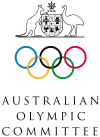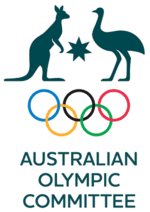Australian Olympic Committee
|
Australian Olympic Committee logo | |
| Country/Region |
|
|---|---|
| Code | AUS |
| Created | 1895 |
| Recognized | 1895 |
| Continental Association | ONOC |
| Headquarters | Sydney, Australia |
| President | John Coates AC LLB |
| Secretary General | Fiona de Jong |
| Website | www.olympics.com.au |
The Australian Olympic Committee (AOC) is the National Olympic Committee responsible for developing, promoting and protecting the Olympic Movement in Australia. The AOC has the exclusive responsibility for the representation of Australia at the Olympic Games (Summer and Winter), the Youth Olympic Games and at Regional Games patronised by the International Olympic Committee (IOC). All National Olympic Committees (currently 205 worldwide) are constituents of the International Olympic Committee.
Organisation
The Australian Olympic Committee is composed of 35 member National Sport Federations representing each sport on the Olympic program for the Summer Olympic Games and the Olympic Winter Games. The AOC is represented in each State and Territory in Australia through State Olympic Councils who are responsible for promoting the Olympic ideals and values and raising funds for the Australian Olympic Teams.
The AOC is responsible for selecting the Team that represents Australia at the Olympic Games, after considering nominations by each National Sport Federation.
The AOC Executive comprises the President since 1990 John Coates, Vice-Presidents Helen Brownlee and Peter Montgomery, chief executive officer Fiona de Jong and members Ian Chesterman, Kitty Chiller, Kimberley Crow, Nicholas Green, Nicole Livingstone, Andrew Plympton, Craig Carracher and Danielle Woodward.
John Coates and James Tomkins are current IOC members. John Coates has been a member since 2001, served on the Executive Board from 2009 – 2013 and was elected Vice-president in 2013. James Tomkins has been a member since 2013.
Patron in Chief is the Governor-General of the Commonwealth of Australia, General Sir Peter Cosgrove, and Patron is Prime Minister of Australia, current prime minister Malcolm Turnbill.
The AOC has an Athletes' Commission, responsible for advising the AOC Executive on all matters pertaining to the Olympic Movement from an athletes perspective. The Commission is made up of 11 members, all Olympians who have been elected by their Olympic team-mates during a Summer and Winter Olympic Games. The Chairperson is Kimberley Crow (Rowing) who also has a seat on the AOC Executive. Deputy Chairperson is Ramone Cooper (Freestyle Skiing, Moguls) and remaining members are Alana Boyd (Athletics), Cate Campbell (Swimming), Steven Hooker (Athletics), Lydia Lassila (Freestyle Skiing, Aerials), Anna Meares (Cycling), Lauren Mitchell (Gymnastics), James Tomkins (Rowing), Ken Wallace (Canoe/Kayak) and Loudy Wiggins (Diving).
History

Australia was represented by Edwin Flack at the 1896 Athens Olympics. Flack won two gold medals. In 1905, Richard Coombes became Australia's first International Olympic Committee member when he replaced New Zealander Leonard Cuff who represented Australasia. In 1914, the Olympic Federation of Australia and New Zealand (OFANZ) was established. In 1920, New Zealand leaves the OFANZ and the Australian Olympic Council was established with James Taylor being its first president. In 1923, Australian Olympic Council changed its name to the Australian Olympic Federation (AOF). In 1990, the AOF rescinded its constitution and became the Australian Olympic Committee (AOC).[1]
Australia has hosted two Summer Olympics: 1956 Melbourne Olympics and 2000 Sydney Olympics.[1] Brisbane, Queensland made at bid for the 1992 Summer Olympics and Melbourne, Australia made a bid for the 1996 Summer Olympics.[2]
Administration
Presidents/Chair
- James Taylor (1920–1944)
- Sir Harold Alderson (1944–1973)
- Sir Edgar Tanner (1973–1977)
- Sydney Grange (1977–1985)
- Kevan Gosper (1985–1990)
- John Coates (1990–present)
Honorary Secretary/Secretary-General
- George Shand (acting) (1920)
- Oswald G H Merrett (1921–1924)
- James S W Eve (1924–1947)
- Sir Edgar Tanner(1947–1973)
- Julius L Patching (1973–1985)
- Phillip Coles (1985–1993)
- Perry Crosswhite (1993–1995)
- Craig McLatchey (1995–2001)
- Robert Elphinston (2001–2004)
- Craig Phillips (2005–2014)
- Fiona de Jong (2014–2016)*[4]
*As of 2015 Secretary General position is now chief executive officer [3]
International Olympic Committee members
Leonard A Cuff (1894–1905) (New Zealander who represented Australasia), Richard Coombes (1905–1932), James Taylor (1924–1944), Sir Harold Luxton (1933–1951), Hugh R Weir, (1946–1975), Lewis Luxton (1951–1974), David H Mckenzie (1974–1981), Kevan Gosper, (1977–2013), Phillip W Coles (1982–2011), Susan O'Neill, (2000–2005), John D Coates (2001 – present), James Tomkins (2013–present)[1][3]
Funding
The AOC is a non-profit organisation responsible for the preparation and participation of Australian Teams at the Olympic Games (Summer and Winter), the Youth Olympic Games and Regional Games.
The AOC is not government funded. The AOC sources its revenues primarily through Sponsorship, Licensing, Fundraising activities and grants from the International Olympic Committee known as Olympic Solidarity. Through the organisation of the State Olympic Councils, Team Appeal Committees across Australia plan corporate events to achieve a national fundraising target. The AOC also receives income distributions from the Australian Olympic Foundation.
The AOC neither seeks or derives any funding from the Australian Government. The Commonwealth Government, through the Australian Sports Commission and the Australian Institute of Sport, is the major funding source for high performance sport in Australia. The ASC/AIS, and State Institutes and Academies of Sport provide critical assistance to the AOCs member National Sport Federations and to athletes directly for their preparation for the Olympic Games.
In the period 2013–2016, the total AOC quadrennial funding of its Olympic programs is budgeted for in excess of $42 million. This funding includes sports on the program of the 2016 Olympic Games, sports on the programs for the 2014 and 2018 Olympic Winter Games and Olympic Education.[5]
International Olympic Committee members
Leonard A Cuff (1894–1905), Richard Coombes (1905–1932), James Taylor (1924–1944), Sir Harold Luxton (1933–1951), Hugh R Weir, (1946–1975), Lewis Luxton (1951–1974), David H Mckenzie (1974–1981), Kevan Gosper, (1977–2013), Phillip W Coles (1982–2011), Susan O'Neill, (2000–2005), John D Coates (2001 – present), James Tomkins (2013–present)[3]
See also
- Australia at the Olympics
- Australian Youth Olympic Festival
- Australian Sports Commission
- Australian Institute of Sport
- Sport in Australia
- Boxing Kangaroo
- Olympic Winter Institute of Australia
- Australian Olympic Foundation
References
- 1 2 3 4 Gordon, Harry (1994). Australia at the Olympic Games. Brisbane: University of Queensland Press. ISBN 0702226270.
- ↑ Jobling, Ian (November 1994). "Olympic Proposals and Bids by Australian Cities" (PDF). Sporting Traditions. 11 (1): 37–56.
- 1 2 3 4 "AOC Office Bearers and Australian IOC Members". Australian Olympic Committee website. Retrieved 13 May 2015.
- ↑ "Australian Olympic Committee CEO Fiona de Jong resigns". The Guardian. 10 October 2016. Retrieved 14 October 2016.
- ↑ Australian Olympic Committee Programs and Funding Guidelines
Bibliography
- Andrews, Malcolm. Australia at the Olympics. Rev. ed. Sydney, ABC Books for the Australian Broadcasting Corporation, 2000.
- Australian Olympic Committee. The compendium : official Australian Olympic statistics, 1896–2002 / compiled by the Australian Olympic Committee. St. Lucia., Qld., University of Queensland Press, c2003
- Gordon, Harry. From Athens with pride : the official history of the Australian Olympic movement, 1894 to 2014. St Lucia, Qld., University of Queensland Press, 2014.
- Gordon, Harry. Gold! : an Olympic celebration. Melbourne : Wilkinson Publishing, 2008
- Poke, Robin ad Berry, Kevin (eds). Olympic gold : our greatest individual Olympians since 1896. Sydney, Murdoch Books, 2012.
